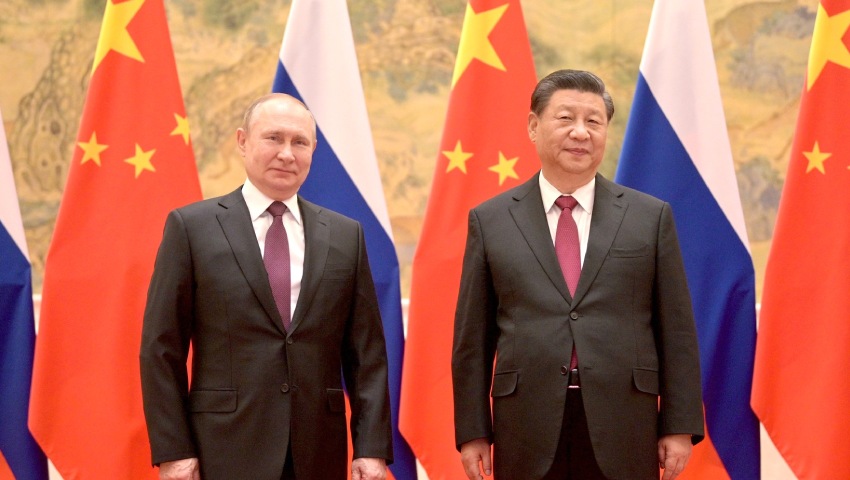Should the United States and its international partners exploit the “deep mistrust” between Putin and Xi to undermine their geostrategic co-operation?
To continue reading the rest of this article, please log in.
Create free account to get unlimited news articles and more!
Just weeks ahead of Russia’s invasion of Ukraine, President Vladimir Putin met with Chinese President Xi Jinping to explore opportunities for strengthening bilateral relations.
The pair released a joint statement detailing their shared geopolitical objectives as part of a “no limits” partnership.
This included joint opposition to further NATO expansion in Eastern Europe, which President Putin ultimately used as a pretext for his assault on Ukraine.
The meeting followed years of joint military co-operation between Beijing and Moscow, which included an agreement to enhance long-range air patrols in 2019.
This newly invigorated alliance has sparked fears of a major disruption to the global peace and security, with Russian expansion in eastern Europe and Chinese aggression in the Indo-Pacific undermining the long-standing rules-based order.
To counter this growing threat from the authoritarian regimes, Ben Scott, director of Australia’s security and the rules-based order project at the Lowy Institute, suggests the West drive a wedge between President Putin and President Xi.
“Tactical differences over Ukraine won’t break Sino-Russian ties,” he writes.
“But those ties still hinge on the relationship between two men: Vladimir Putin and Xi Jinping.”
Scott notes that closer ties with Russia “offset” Beijing’s unfavourable status among other nations, particularly those strongly aligned to the United States.
China, he adds, can help carry the burden of sanctions against Russia, while Moscow can ensure oil and gas supplies to Beijing across a shared land border.
Russia can also help modernise China’s military and offer conventional and grey-zone warfare support.
As such, the adoption of a “reverse Kissinger” approach to geostrategic policy by the United States and its allies would not be enough to undo Sino-Russian ties.
“Henry Kissinger capitalised on the Sino-Soviet split to create the US-China relationship and use it against the USSR,” Scott notes.
“Since the Ukraine invasion many have gone back to talking once again about how to turn China against Russia. Neither is realistic.
“It’s almost impossible to imagine Washington now making the sort of concessions – to either China or Russia – necessary to fundamentally alter the strategic triangle.”
Instead, Scott argues, the US and other like-minded nations should focus on weakening the personal relationship between President Putin and President Xi.
Some observers, including former Australian prime minister Kevin Rudd, have described the “chemistry” between the pair as “deep”, with Rudd claiming they “admire each other’s ruthless political skills”.
However, Scott contends it is more likely President Xi and President Putin regard one another with “deep mistrust”.
“Viewed in that light, their frequent meetings can be seen as an effort to keep an eye on one another as they try to make the relationship more mutually beneficial,” he continues.
“Their personal intervention is necessary because Xi and Putin are surrounded by underlings unwilling to use their initiative for fear of making a mistake.
“It’s one thing for leaders to set the strategic direction, it’s another for bureaucrats to overcome their natural aversion to working with anyone outside their organisation – let alone from another country.”
Scott suggests the lengthy 5,000-word ‘no limits’ agreement between the nations is a reflection of their mutual distrust.
“Xi and Putin really have to spell it out if they want it done,” he writes.
Accordingly, Scott claims the West should explore any opportunities that heighten distrust between the pair.
This could include exploiting tensions linked to the war in Ukraine.
“The war in Ukraine won’t fundamentally alter the Sino-Russian partnership but tactical differences could impose some limits on the supposedly ‘no limits’ partnership,” he writes.
“Putin may not have fully disclosed his intentions to Xi and China is clearly uncomfortable about being associated with Russia’s behaviour.
“In return for watered-down language, Beijing abstained rather than vetoed a UN Security Council resolution ‘deploring’ the invasion.”
Further, Scott suggests US President Joe Biden continue refraining from presenting China and Russia as common foes.
Rather, he adds, Biden should engage Xi and Putin separately.
“Opportunities to fuel suspicion that he may cut a deal with one or the other should be taken,” he writes.
“This won’t produce another grand strategic split between China and Russia. That’s off the table for the foreseeable future.
“But even incremental limitations on the China-Russia partnership will be consequential.”
Get involved with the discussion and let us know your thoughts on Australia’s future role and position in the Indo-Pacific region and what you would like to see from Australia's political leaders in terms of partisan and bipartisan agenda setting in the comments section below, or get in touch with

 Login
Login







